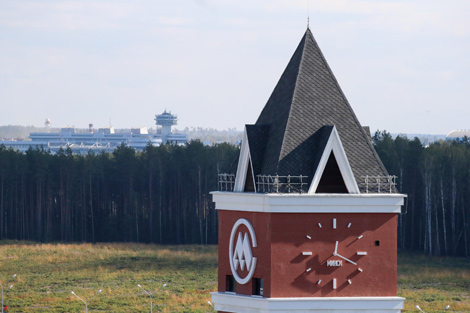Events
Wider adoption of China-Belarus industrial park’s investment practices suggested
 MINSK, 8 December (BelTA) – It is advisable for the rest of Belarus to adopt the routines the China-Belarus industrial park Great Stone uses to work with investors. Head of the China-Belarus industrial park Great Stone administration Alexander Yaroshenko made the statement during the roundtable session held in the upper chamber of the Belarusian parliament on 8 December to discuss ways to improve the law on investments, BelTA has learned.
MINSK, 8 December (BelTA) – It is advisable for the rest of Belarus to adopt the routines the China-Belarus industrial park Great Stone uses to work with investors. Head of the China-Belarus industrial park Great Stone administration Alexander Yaroshenko made the statement during the roundtable session held in the upper chamber of the Belarusian parliament on 8 December to discuss ways to improve the law on investments, BelTA has learned.
Alexander Yaroshenko reminded that the head of state had signed a number of decrees to improve the operation of the industrial park over the years since the park was established. A number of legislative novelties were introduced by decree No.166. “I believe these novelties should be possibly adopted in other territories, too, like free economic zones and even entire Belarus,” said the official.
Working with investors using the one-stop shop principle was the first important aspect the park’s administration adopted after studying the experience of Chinese partners. “In Belarus investors would like to enjoy comfort in their line of work. They would like to understand who they should contact for various permission procedures. If everything is found under one roof just the way we are starting to do it in the park, if representatives of government agencies can be found in the same location and the investor can contact the park administration for any question, then the investor’s work will be comfortable,” said Alexander Yaroshenko. In his opinion, the one-stop shop approach is very convenient and the practice should be adopted for interaction with investors all over Belarus. “Saving time is profitable for investors and us, too,” he noted.
The construction and commissioning of buildings is another thing Alexander Yaroshenko mentioned. The official believes that mechanical strength and the observance of environmental regulations should be the top priorities in the course of commissioning buildings. The norm is reflected by decree No.166. “These norms are sufficient. Respectively two signatures are sufficient to commission a facility. For now the investor has to obtain 14 signatures in accordance with Belarusian laws,” said Alexander Yaroshenko.
The head of the China-Belarus industrial park Great Stone administration noted that there are certain hidden aspects to this situation. If an investor builds a facility and gets 14 signatures testifying the building is fit, the investor actually shifts responsibility for the consequent operation of the building onto other agencies. “The investor should be primarily the person responsible for the facility. We should help him or her commission it as fast as possible and as cheaply as possible,” he said.
Another regulation the China-Belarus industrial park Great Stone enjoys is the ability of investors, shareholders, founders, and people involved in an investment project to stay in Belarus for 180 days per calendar year without visas. “This norm can and should be spread onto investment projects in the rest of the country,” Alexander Yaroshenko was convinced.
The China-Belarus industrial park Great Stone is under construction in Smolevichi District, Minsk Oblast. The park is supposed to become a major hub as part of the Silk Road Economic Belt in Belarus. At present the park is home to 23 resident companies. Apart from Belarusian and Chinese companies there are representatives of the USA, Russia, Lithuania, Austria, and Germany. The number of residents may grow larger by the end of the year.








 print version
print version make home page
make home page add to bookmarks
add to bookmarks

